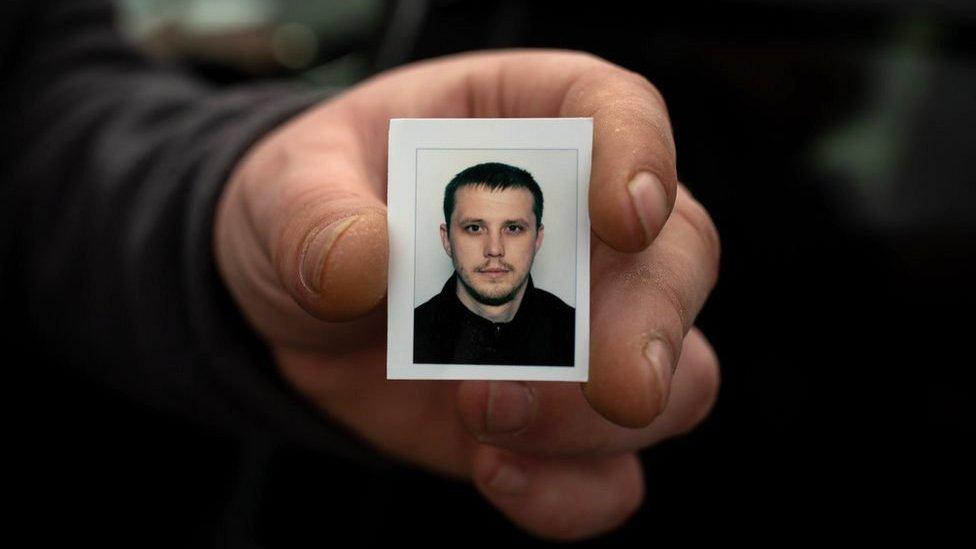'It's like Chernobyl now': Life in Kharkiv's ghost town
- Published

Saltivka, in the eastern Ukrainian city of Kharkiv, has been relentlessly bombarded by the Russians. Among the ruins, a few residents are trying to survive.

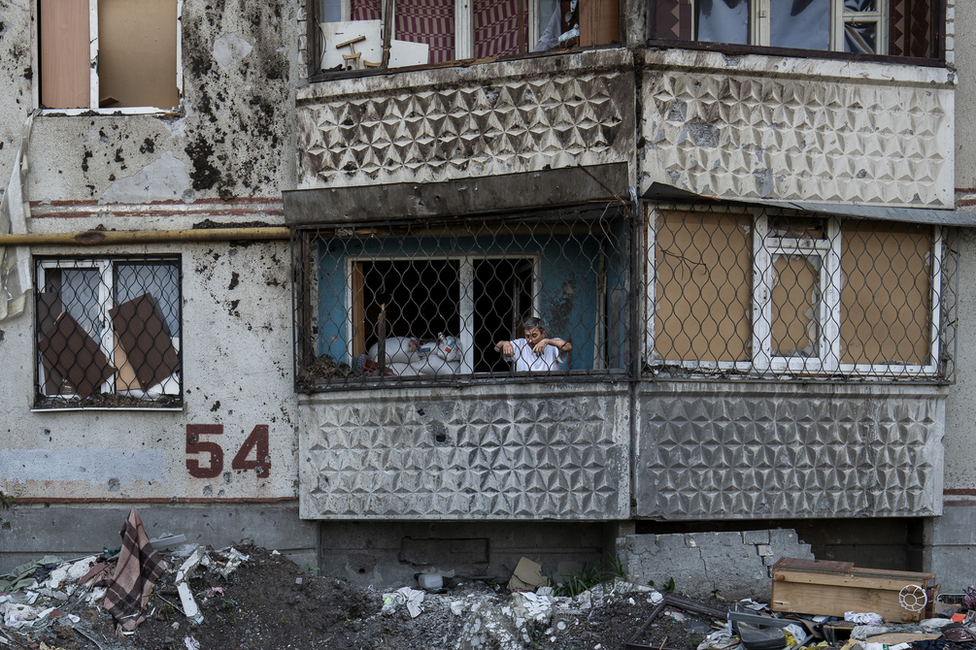
A resident of Saltivka building 54 looks down from his balcony at a shell crater beneath. "This is the Russian world," he said

When Russian shells began raining down on Saltivka in February, life in the neighbourhood's numbered apartment blocks became a lottery - one block hit, the next spared. Inside each building, the residents of each apartment survived by their own luck - one apartment turned to ash, the next untouched.
As the bombardment of Kharkiv went on - March, April, May, June - fewer and fewer buildings in Saltivka were spared. Now the neighbourhood is a ghost town. Everywhere you look, deathly black burn marks rise up from the windows where shells hit. There are multi-storey gashes in the sides of the buildings. There are neat circular holes in the roofs where shells punched through but didn't detonate. There are personal possessions strewn over the pathways between the buildings - ejected from the flats above with terrible force. And the shells are still falling.


The remains of what was an apartment block in Saltivka. Everywhere you look, there is destruction

When they land they shake the ground and send a boom bouncing off the buildings and echoing across the empty green spaces and playgrounds. The different shells and rockets have distinctive sounds and leave distinctive pieces of shrapnel that locals have become adept at recognising. They include remnants of widely banned cluster munitions and unguided rockets. None of the weapons are precisely targeted, so nowhere in the neighbourhood is safe.
When there is no shelling, Saltivka falls silent. "Saltivka is like Chernobyl now," said Serhiy Khrystych, 44, as he washed his face with water from a plastic bottle, in building 80. "Of course there was the radiation in Chernobyl, but it was not destroyed. We do not have the radiation but everything here is destroyed," he said. "It is impossible to live."

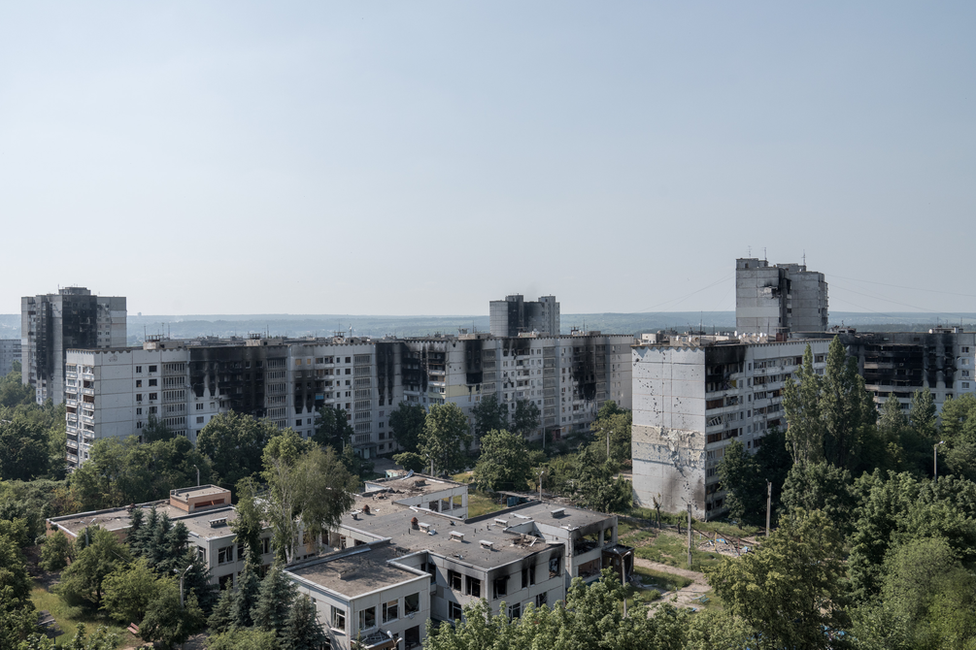
All around Saltivka, burn marks rise up from the windows where fires raged. Nearly every building has been hit

Yet there are people living here, eking out an existence in buildings with no gas or water, in some places just one or two residents in a block of 60 or more flats. The electricity has been switched back on in some buildings in the past week, and a few people have returned from the metro stations or other shelters. But it is still a tiny fraction of Saltivka's pre-war population.
At its height, the neighbourhood - a Soviet era development for the city's industrial workers and their families - was home to somewhere between 500,000 and 800,000 people. It was full of family life.
"It was a beautiful area, there was a beautiful park and there was light in the park, and benches and a fountain," said Tamara Koneva, a 70-year-old pensioner living on the ground floor of a half-destroyed building. "Now there is nothing left," she said.

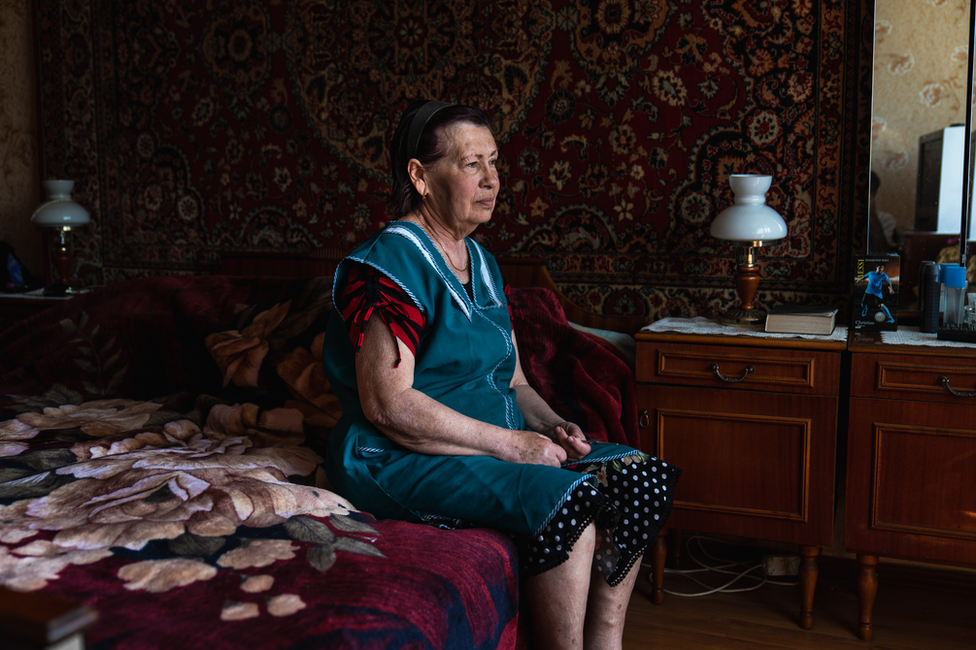
Tamara sits in her bedroom in her half-destroyed building. “It was a beautiful here," she said. "Now there is nothing left"

Tamara's husband died in March, a month after the invasion. "Because of the stress," she said. So she is mostly alone in their apartment, and nearly alone in the building. "I miss him," she said. "I don't even have the desire to go outside."
There is one other person in Tamara's part of the building - a 53-year-old car mechanic called Valeriy Ivanovych, who has lived here for 20 years. His flat has been spared, so far, save for small pieces of shrapnel that broke his windows and punctured his washing machine, kitchen cupboard and bedroom wall like bullets.
"Barely anybody lives in this building anymore, there is only one couple, a man, a woman and me," Valeriy said. "People sometimes come to collect belongings but they don't stay."

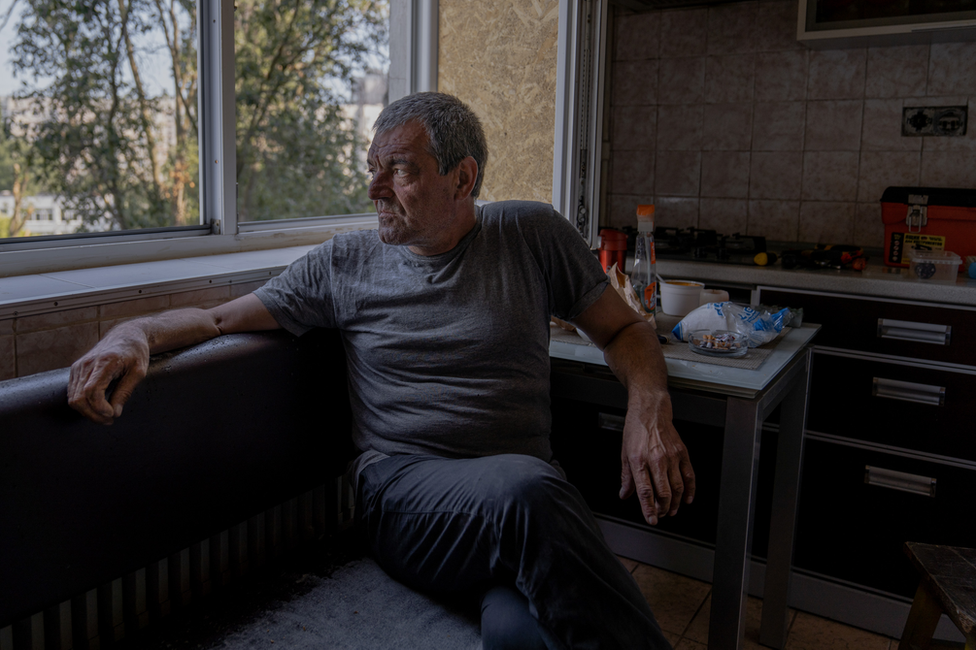
Valeriy Ivanovych looks out from his apartment window. Only two people are left among the 18 apartments in this side of the building

The flats on Tamara and Valeriy's side of the stairwell were relatively undamaged, but a shell hit the other side directly and the apartment opposite Valeriy's was only ash, collapsed concrete and charred possessions.
"Maybe the building will have to be destroyed, because the second part of it is destroyed and the third part is very much destroyed," Valeriy said.
He has no work now and nowhere else to go. He shrugged. "This is my home, I have lived here all my life," he said, staring out his kitchen window over the trees.
"It will be a great sadness if all these houses are destroyed because I am very used to this place."

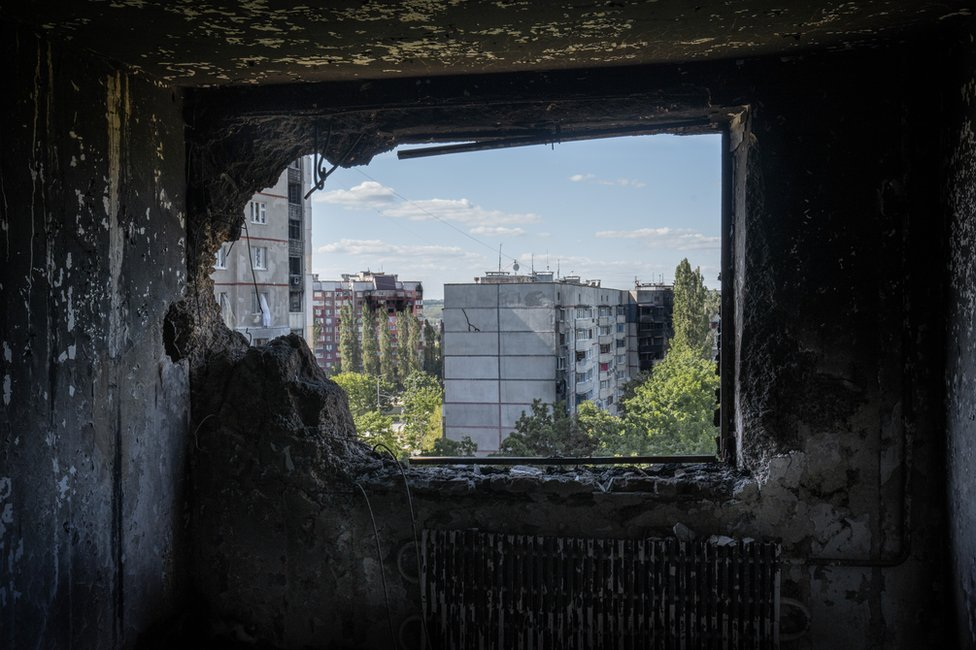
The view from a destroyed Saltivka apartment. Many have been turned to little more than ash

With no utilities available in their apartments, some of the residents still living in Saltivka have created makeshift outdoor kitchens where they cook food and sit together for company. Once a day, volunteers from the food charity World Central Kitchen make their way around the neighbourhood and hand out meals in styrofoam boxes.
"Saltivka is a desert now," said Leon Petrosyan, a 50-year-old engineer who was carefully navigating a beaten-up black Volga around shell craters and debris, in order to hand out the food. "The people who are left here have nowhere else to go," he said. "They are trapped."

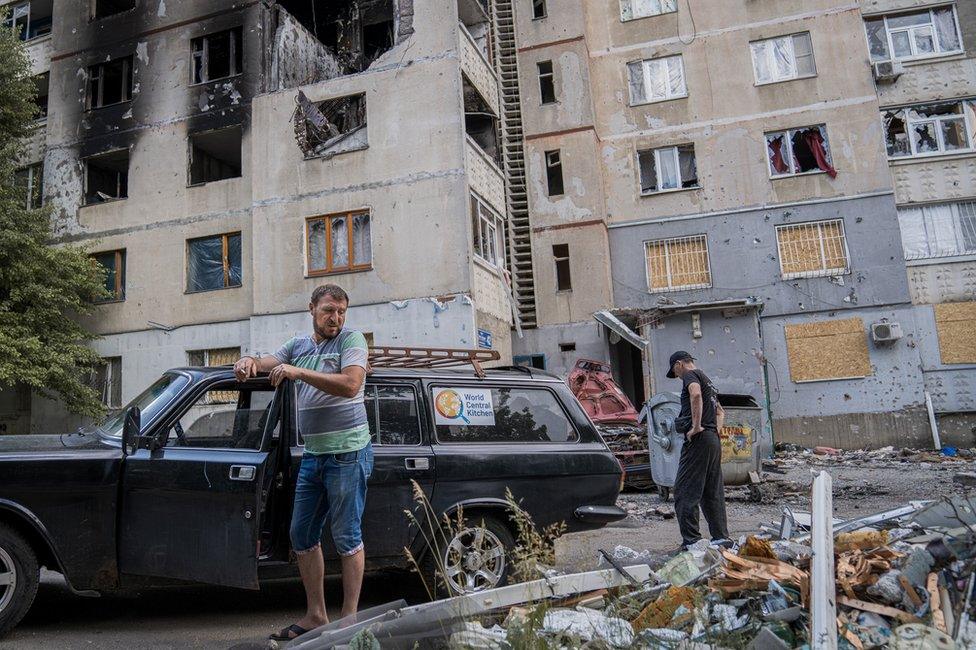
Food delivery volunteer Leon Petrosyan smokes a cigarette. "The people here have nowhere else to go," he said. "They are trapped"

Leon stopped for a break and lit a cigarette. The food deliveries are a lifeline for the few residents in Saltivka. There are no shops open here now and for many it is the only meal they eat each day.
Serhiy Zhuravliov, a 51-year-old, lifelong Saltivka resident who was helping deliver the food, said he had stayed in the neighbourhood throughout the invasion and the worst of fighting nearby, when Ukrainian troops were stationed in the residential buildings and the frontline was on the doorstep.
"At first we felt fear. Later, we got used to the sound of the shelling," he said. "Now we can't go to sleep without it."

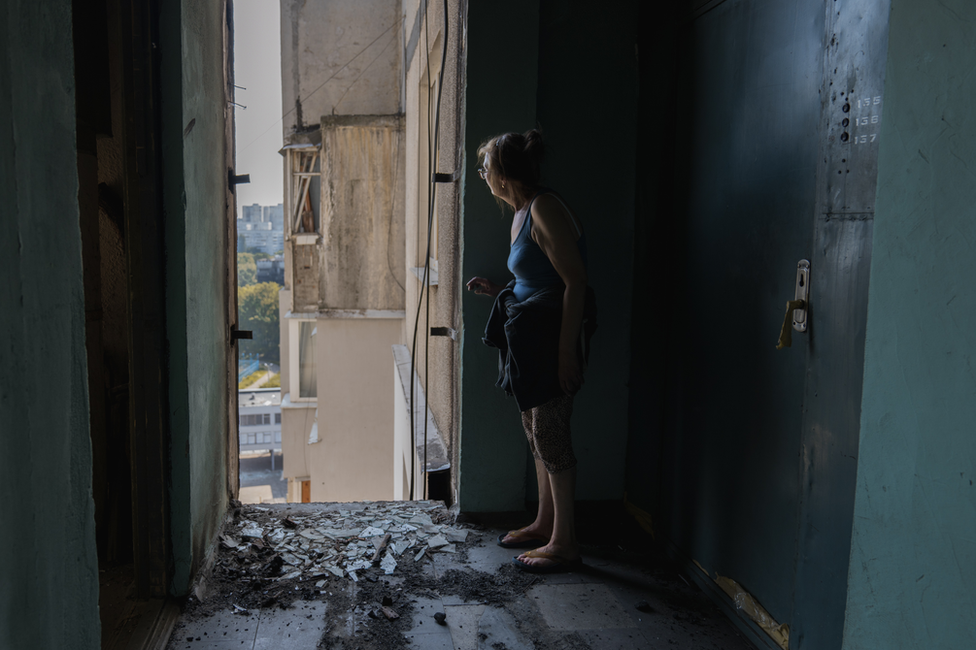
Larisa looks out from her hallway on the 16th floor. She is worried the building will collapse

Looming over Leon and Serhiy as they smoked was a 16-storey tower gouged and burned by direct hits. Up on the 16th floor, Larisa Enina looked out carefully from her hallway on to the high open air, through a gap where part of the wall used to be.
There were about 15 people left in the 143-apartment building, Larisa said. The apartment she shares with her husband and daughter was relatively undamaged, save for shrapnel holes in the windows. "The apartment near ours burned down completely and ours remained intact," she said. "It is a miracle."
But Larisa was worried about something else. There were big cracks in the walls on the 11th floor, she said, and she thought the building could collapse. "It is a risk even to stand on the balcony now," she said.

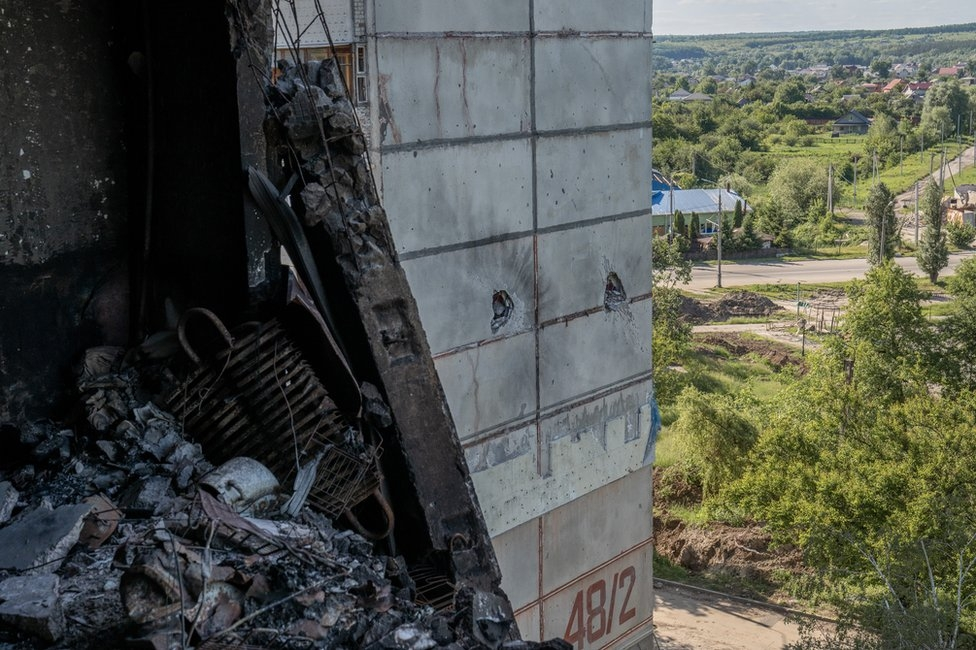
Saltivka's buildings are marked by distinctive holes from rockets and shells. Some still contain unexploded ordnance

It's also a risk to stand below. The shell hits dislodge slabs of concrete the size of cars from the top floors that slam into the pavements below with terrifying force. If you look up from the ground, you can see slabs that have been loosened but not fallen, and they sit precariously above the remaining residents.
Directly outside the entrance to one building, a massive slab had gone through four feet of pavement and earth and smashed a thick water pipe below. Roman Grynchenko, a 48-year-old car mechanic who has lived in Saltivka for 20 years, was stepping around the water-filled crater as he went in and out of the building.

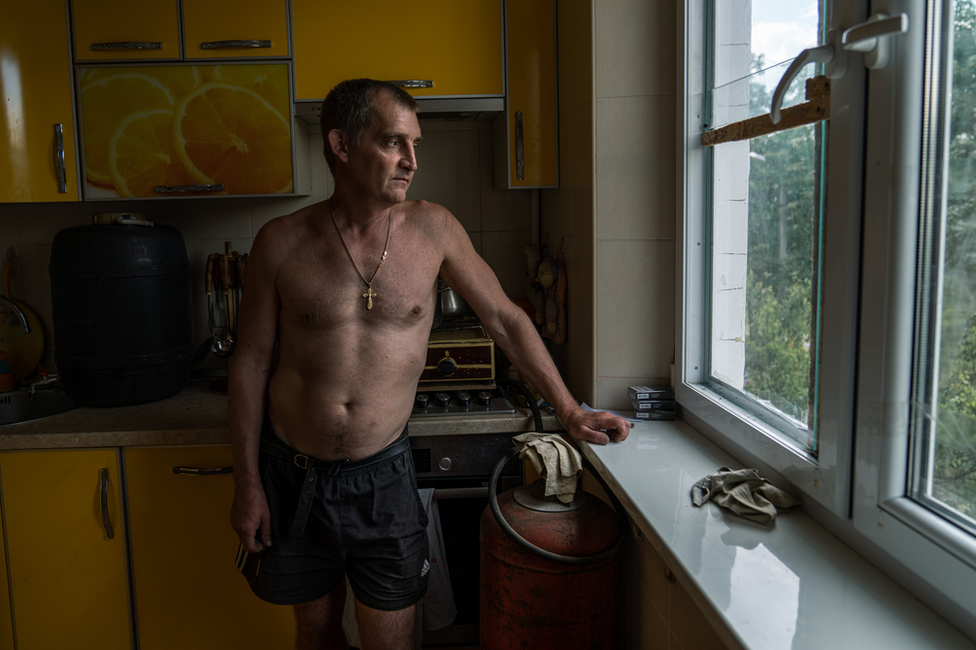
Roman Grynchenko's flat survived the shelling so far. Three floors above him are completely destroyed

Roman eats one free meal a day now and, like most people here, gets by on government assistance - £55 per month for him, £55 for his wife, and £83 for their daughter.
"I've been living here for 20 years," Roman said. "Saltivka was a peaceful district ..."
A deafening crack cut him off - the first of three shells landing nearby.
"Now there is a war," he said. "You hear explosions."

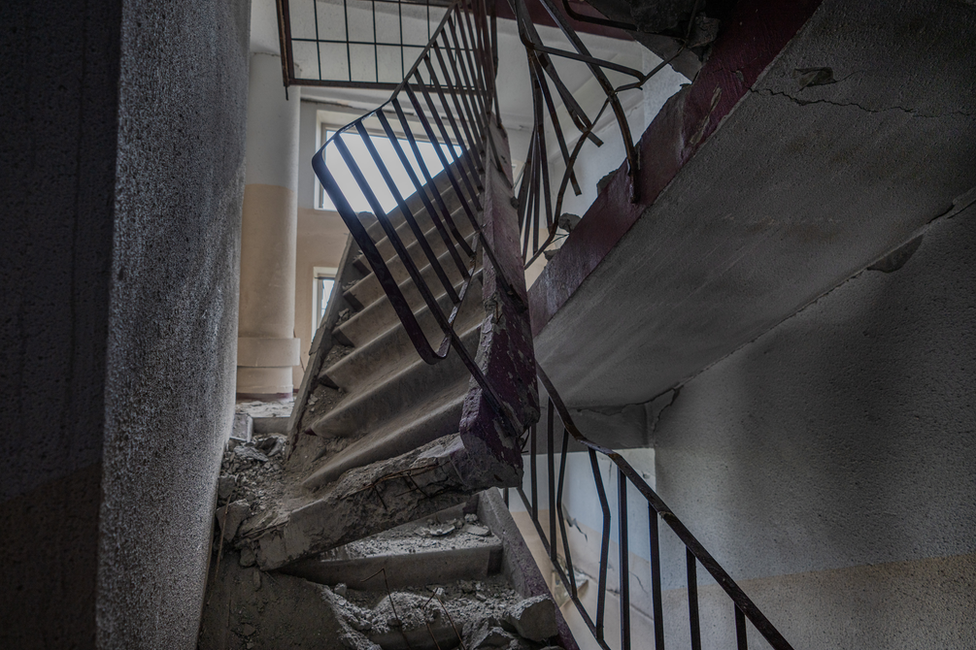
The concrete stairwell two floors above Roman's apartment, smashed by a direct hit on the roof

The Russians attempted to seize Kharkiv in the early days of the invasion and Saltivka bore the brunt of the assault. The invaders were eventually pushed back, and the frontline now sits about 12 miles from the city centre. But Saltivka remains well within Russian artillery range, a reality made impossible to ignore by the daily shelling.
At the edge of the neighbourhood, there are still trenches where the Ukrainians dug in for the defence of the city, and chewed curbstones where their tanks mounted the pavements. They used the residential buildings for rest and for sniper positions, residents said - turning the neighbourhood into a target.

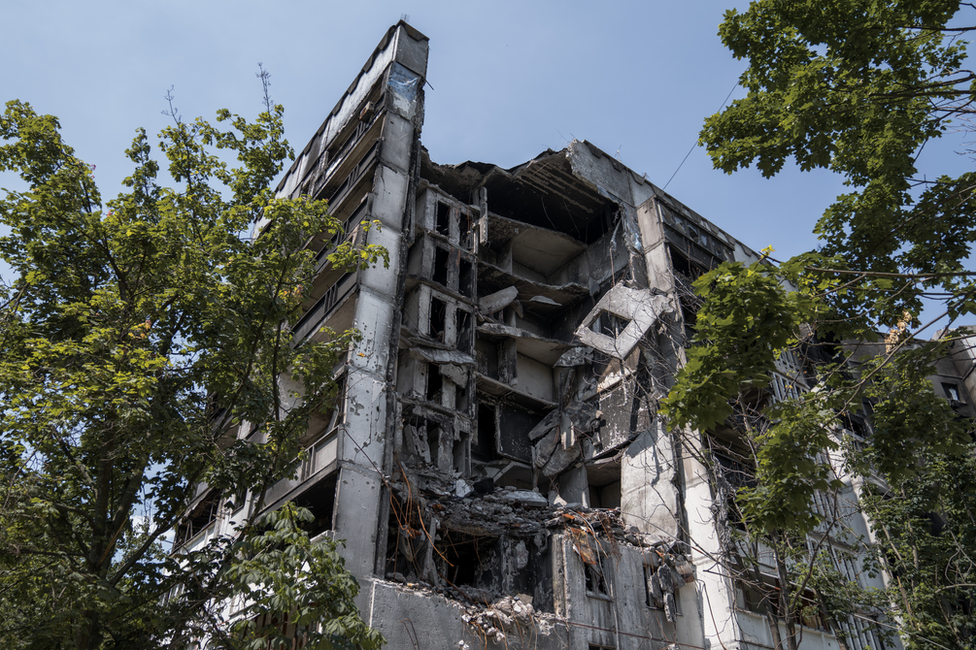
Multi-storey gashes have been torn in the apartment buildings around Saltivka. They will have to be destroyed

Few residents seemed to begrudge their presence. The soldiers went from building to building at the beginning asking those with children to evacuate, said Claudia Chubata, a 65-year-old resident of 33 years.
"They are our soldiers," she said. "They needed to do something here for the war and they needed somewhere to rest."
But Kharkiv is just 20 miles from the Russian border, a traditionally Russian-leaning, Russian-speaking city, and there are pockets of sympathy towards the invaders.
"Where there is no Ukrainian military, the Russians do not shoot," said Boris Rustenko, a 63-year-old glass miller, born in the Soviet Union, whose building was badly damaged and burned.
"If Russia had not attacked Ukraine, Ukraine would have attacked Russia, Crimea, Donetsk, Luhansk," Boris said. "It is very simple, Russia is just ahead."

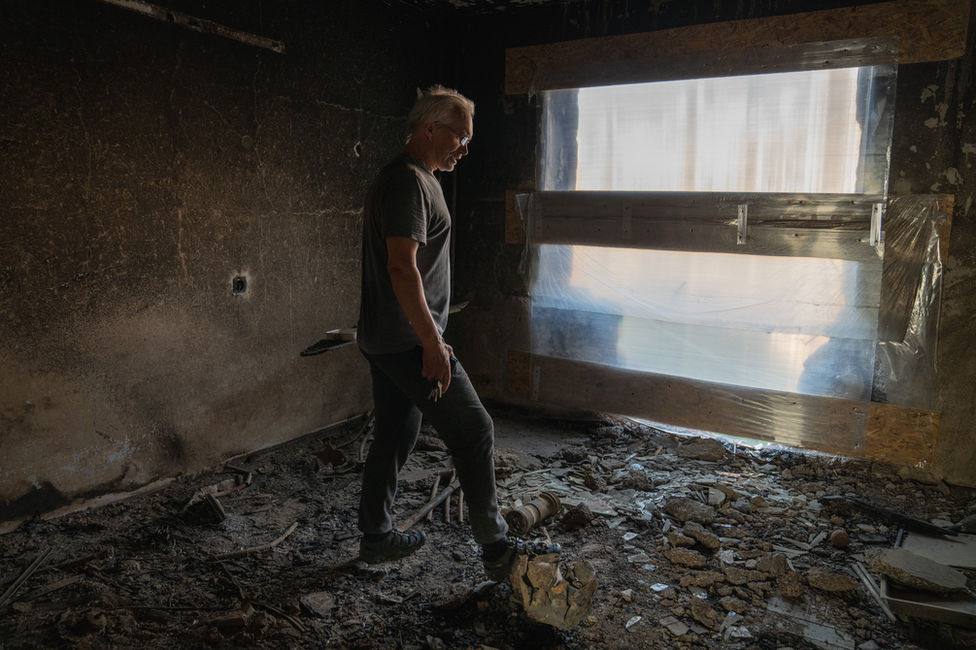
Boris Rustenko rests his foot on rocket shrapnel in his building. “Ukraine would have attacked Russia," he said. "Russia is just ahead”

Boris, like many residents of Saltivka, has relatives in Russia. In cities like Kharkiv, the Russian-backed violence that began in 2014 and the recent invasion have created smaller conflicts among family and friends.
"This is Russia, we were brothers," said Oleksiy, a 69-year-old builder, who didn't want to give his last name. "We don't understand why they invaded. We have relatives there, and now what?"
Russia alone was not to blame, Oleksiy thought. The West should "stop giving Ukraine weapons", he said, because it was only prolonging the war.

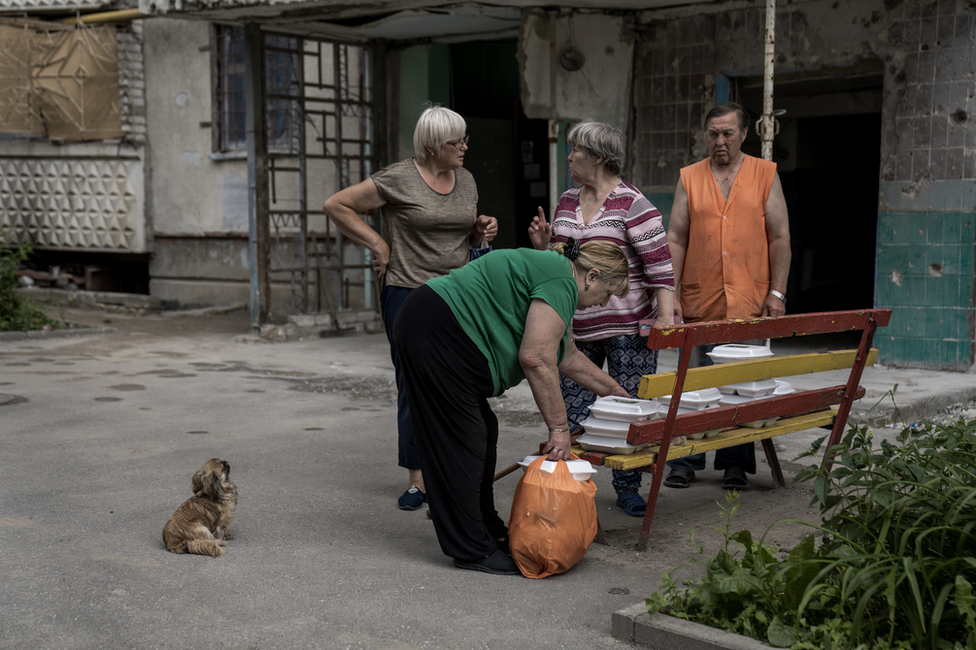
Saltivka residents collect free meals delivered once a day by a food charity. For many, it is their one meal a day now

As Oleksiy was talking, another resident standing next to him started to cry. "We were so happy to have flats here," said Halyna, a 62-year-old pensioner. Her windows, directly above where she stood, were smashed. "We were told to replace them ourselves," she said. The repairs would cost five times her monthly pension.
Less than 10 miles away from where Halyna stood was the frontline. There are fears that Russian troops might return to Kharkiv. Vadym Denysenko, an adviser to Ukraine's interior minister, said on Sunday that Russia was once again "trying to make Kharkiv a frontline city".
Outside Halyna's building, a few neighbours from buildings nearby were coming up to collect their daily free meal from a bench. It was late afternoon. Halyna looked on, a tear still under her eye.
"How many have been killed now?" she said, shaking her head.
"And just boys, 18 years old. They had only just begun to live."
Rita Burkovska contributed to this report.
Related topics
- Published11 June 2022
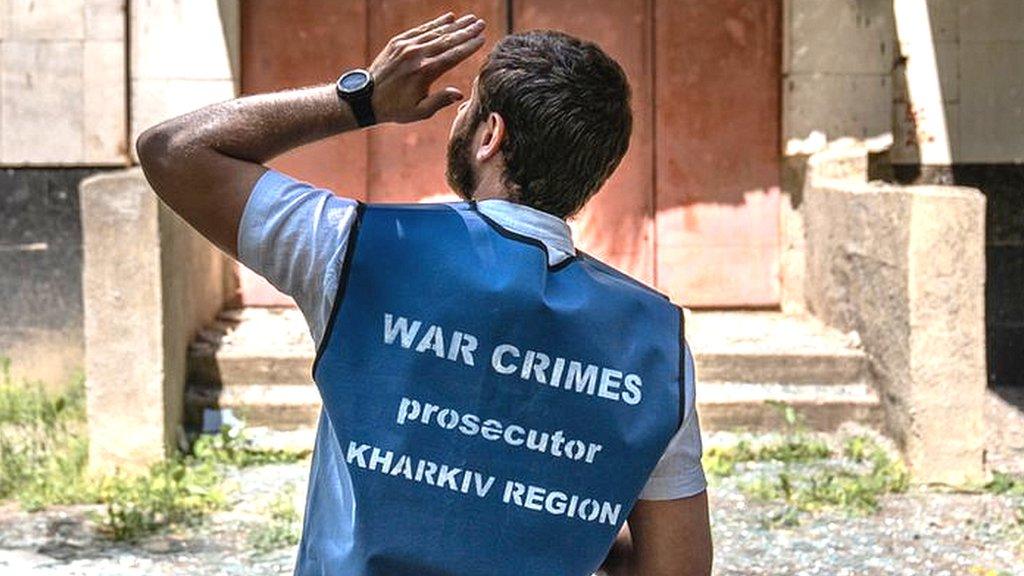
- Published8 June 2022
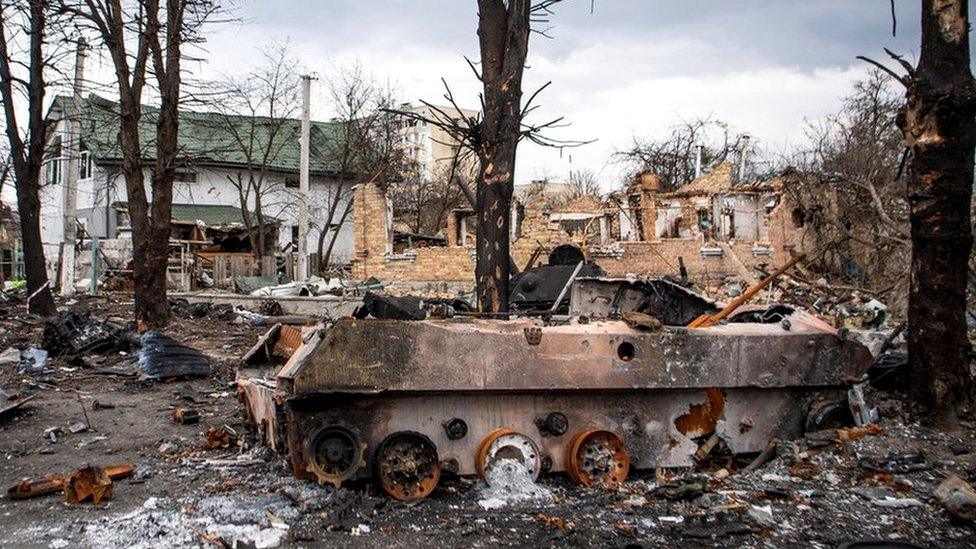
- Published13 April 2022
